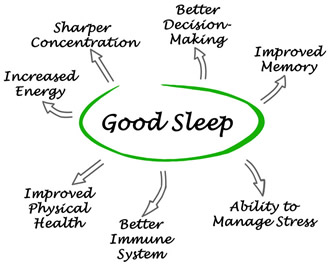13 Tips to Getting a Good Night's Sleep
Like eating, exercising, and handling stress well, getting a good night's sleep is also vital to your well-being. And as active professionals with widely varying schedules and critical deadlines, we are prone to skimping on our sleep. Here are 13 tips to making the best of your sleeping hours.
If after following these tips you still do not get the sleep you need, make an appointment to discuss your sleep problem with your doctor. Sleep is important!
- Stick to a sleep schedule.
Go to bed and wake up at the same time each day — even on the weekends.
- Exercise is great but not too late in the day.
Avoid exercising closer than 2 - 3 hours before your bedtime.
- Avoid caffeine and nicotine.
The stimulating effects of caffeine can take as long as 8 hours to wear off fully. Nicotine is also a stimulant. Stimulants can make it harder to get sleep, cause you to awaken during the night, and lower your quality of sleep.
Eliminate or reduce your caffeine intake and nicotine use, especially in the evening. Caffeine is found in coffee, many teas, colas, chocolate, and some foods.

Drowsy driving causes an estimated average of 83,000 crashes a year, with about 37,000 injury accidents. Drowsy driving claimed 846 lives in 2014. As tragic as these numbers are, it is widely recognized that drowsy driving is underreported as a cause of crashes. In fact, by some research methodologies, there could be as many as 1.2 million crashes, 8,000 lives lost and 500,000 injuries due to drowsy driving each year. 1
Contrary to common belief, drinking coffee, rolling down the window, or turning up the radio will NOT help you stay alert enough to drive.
Experts advise that the remedy for sleepiness while driving is to pull over and take a 15 to 20 minute nap. Don't sleep more than 20 minutes; however, because your body goes into a deeper sleep after that and you'll feel groggy when you wake.
Before driving, get a good night's sleep, avoid drinking any alcohol, use public transportation or have someone else drive if you take medications that cause drowsiness, and avoid driving during your peak sleepiness periods (typically midnight - 6 am, and late afternoon).
- Better Yet, Quit Smoking.
Not only is nicotine a stimulant to be avoided, smoking cigarettes raises blood pressure, increases heart rate, and intensifies brain-wave activity. Don't forget the safety hazard of smoking in bed!
- Avoid alcoholic drinks before bed.
A "nightcap" might help you get to sleep, but alcohol keeps you in the lighter stages of sleep. You also tend to wake up in the middle of the night when the sedating effects have worn off.
- Avoid large meals and beverages late at night.
A large meal can cause indigestion that interferes with sleep. Drinking too many fluids at night can cause you to awaken frequently.
- Avoid medicines that delay or disrupt your sleep, if possible.
Some commonly prescribed heart, blood pressure, or asthma medications, as well as some over-the-counter and herbal remedies for coughs, colds, or allergies, can disrupt sleep patterns.
- Don't take naps after 3 p.m.
Naps can boost your brain power, but late afternoon naps can make it harder to fall asleep at night. Also, keep naps to under an hour.
- Relax before bed.
Take time to unwind. A relaxing activity, such as reading or listening to music, should be part of your bedtime ritual.
- Take a hot bath before bed.
The drop in body temperature after the bath may help you feel sleepy, and the bath can help relax you.
- Have a good sleeping environment.
Get rid of anything that might distract you from sleep, such as noises, bright lights, an uncomfortable bed, or a TV or computer in the bedroom. Also, keeping the temperature in your bedroom on the cool side can help you sleep better.
- Have the right sunlight exposure.
Daylight is key to regulating daily sleep patterns. Try to get outside in natural sunlight for at least 30 minutes each day.
- Don't lie in bed awake.
If you find yourself still awake after staying in bed for more than 20 minutes, get up and do some relaxing activity until you feel sleepy. The anxiety of not being able to sleep can make it harder to fall asleep.
If you are spending enough time in bed and still wake up tired or feel very sleepy during the day, you may be one of the estimated 40 million Americans with a sleep disorder. Your family doctor or a sleep specialist should be able to help you.
The most common sleep disorders are insomnia, sleep apnea (sleep-disordered breathing), restless legs syndrome, and narcolepsy. Although sleep disorders can significantly affect your health, safety, and well-being, they can be treated.
For more information, consult your health care provider and NHLBI's Your Guide to Healthy Sleep.

- National Highway Traffic Safety Administration, Drowsy Driving, 2015.
- National Heart, Lung and Blood Institute (NHLBI), Your Guide to Healthy Sleep, August 2011.
- National Heart, Lung and Blood Institute (NHLBI), In Brief: Your Guide to Healthy Sleep, September 2011.
- Federal Motor Carrier Safety Administration, Facts about Sleep Apnea, February 19, 2014.